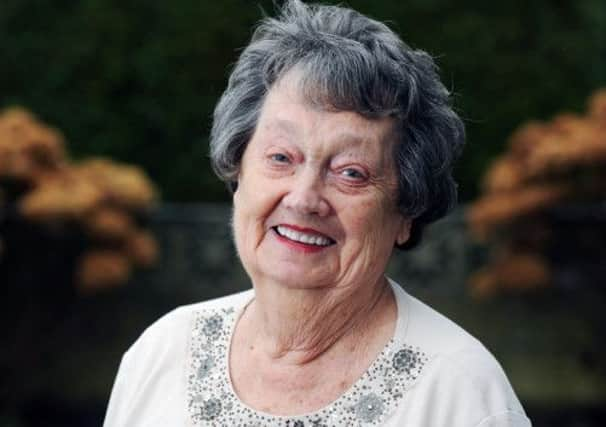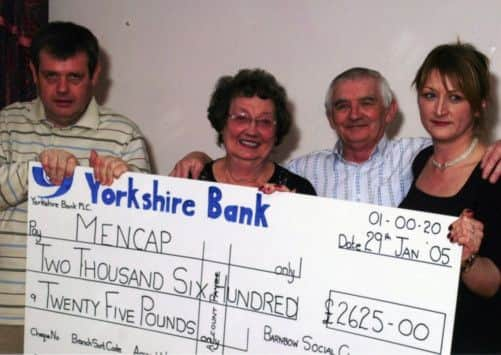A mother’s mission for her son... and the struggle she won over six decades


Tiger mothers come in many guises.
These days it’s a term used to describe a certain sort of woman – an ambitious, determined one who will do almost anything to make sure her children are the best. Some might call them pushy.
But look at Joyce Fieldhouse and you are looking at the original tiger mother.


Advertisement
Hide AdAdvertisement
Hide AdWith her greying hair and walking sticks she might not look the part – but, believe me, she is.
Because Joyce has spent her life doing almost anything for her son Andrew. And though she is 85 and he is now 60, her role as tiger mother continues.
Not that Joyce has ever wanted anything particularly ambitious for Andrew. She has only ever really wanted one thing, and that is for him to be given a chance of a life, because Andrew is autistic and unable to live independently.
And in trying to help Andrew, Joyce has done so much for other children with learning disabilities over six long decades that she has been awarded the British Empire Medal.
Advertisement
Hide AdAdvertisement
Hide AdLater this month, she will attend a Queen’s garden party at Buckingham Palace with her daughter Amanda, in honour of all she has achieved.
Perhaps today, Joyce’s determined work doesn’t sound so unusual. After all, autism is much in the news now, but Andrew was born in 1953 when the rules of what could and could not be talked about were very different. Learning difficulties and all issues of mental health were firmly in the area of subjects not to be discussed.
Joyce said: “Andrew seemed to be developing perfectly normally until he was about three years old.
“I remember being on holiday and he seemed to be ducking his face down a lot. Then he began to have fits.
Advertisement
Hide AdAdvertisement
Hide Ad“I went to the doctor and asked if it was epilepsy. He said ‘something like that’ and sent me away with some tablets.
“That’s how it was then, people thought it was best if you didn’t know.”
Over the next two years Andrew deteriorated to such an extent that he stopped speaking at all for a year.
“I tried everything. I would put his fingers on my mouth as I spoke to try to help him remember how to form the words, but he wouldn’t. When he did eventually start to say words again the first one he said was ‘daddy’ – after all my hard work.
Advertisement
Hide AdAdvertisement
Hide AdHer husband Frank died many years ago in 1990, but in those early days he did his best to help. There was a time when Andrew became terrified of the bath after a stay in hospital, and only Frank could bathe him.
Joyce makes light of a dark period. The 1950s were a period when people would be unthinkingly cruel about anyone who was different. Joyce said: “People would mimic Andrew, one person said to me that he shouldn’t be allowed out. Times were much more brutal. Another mum I knew wouldn’t let her disabled little boy out in the garden ever, she was too afraid of what people would say.
“But I would always speak up for Andrew, I couldn’t help myself. Some girls were making fun of him one day and I told them that one in five families had a child with problems, so it could happen in their families too.”
When Joyce’s second child Valerie was born, when Andrew was aged six, Joyce had to keep her permanently in the bedroom, except for feeding times, to keep her out of harm’s way.
Advertisement
Hide AdAdvertisement
Hide Ad“Andrew didn’t mean to hurt her, but he wanted to get hold of her, he didn’t understand.”
All of this was exhausting – when Andrew slept, Joyce slept – but it wasn’t enough to keep a determined woman down.
As Andrew grew older, Joyce realised that the help he needed was just not there, so the woman who had worked as an office clerk before her children were born and had never sat on a committee in her life set about changing all that.
After one too many days taking Andrew to a training centre where he was taught exactly nothing by untrained staff, Joyce took action.
Advertisement
Hide AdAdvertisement
Hide AdShe joined with other similarly unhappy parents and formed a committee.
Their aim was to persuade Leeds City Council to train the staff so that the children could be helped, instead of simply removed from their parents for the afternoon.
They succeeded. It took two years and Andrew was too old to attend the centre by the time trained staff arrived – but they succeeded.
After that, it was hard to stop them.
Joyce and her fellow helpers set up the Leeds branch of the charity Mencap, dedicated to helping those with learning difficulties and their families. In those days it was called the Leeds and District Society for Mentally Handicapped Children and Adults, snappy titles not being part of the post-war thinking, either. Joyce was on the executive.
Advertisement
Hide AdAdvertisement
Hide AdJoyce went on to have two more children, Amanda and Deborah, but that didn’t stop her desire to make a difference.
She began fund-raising: she helped the group set up in Mencap House on Chapeltown Road, she helped organise holidays, helped set up a holiday home, a residential home and a nursery.
Everything worked. The nursery grew from two sessions a week to full-time, the holiday group stayed together for 30 years, taking trips to Benidorm among other places.
The very last one happened last year. By then it was down to four people – Joyce, Andrew, her friend Annie and her daughter Theresa, who had both Down’s Syndrome and dementia.
Advertisement
Hide AdAdvertisement
Hide AdThere is a lot of laughter as Joyce recalls just what a sight they were – two old women, an autistic man and a Down’s Syndrome woman whose dementia made her determined to escape from them at every opportunity. They had a cracking time.
In general, the changes Joyce helped bring about have not always helped her own son. Often, by the time the improvement had been made, he was no longer able to benefit from it.
Andrew has never learned to read or write, he has never had speech therapy but Joyce, ever the tiger mother, has always battled for him and others like him as best she could.
She has tried to retire from Mencap, she says, but the calls come in and somehow she always gets herself involved.
Advertisement
Hide AdAdvertisement
Hide AdThese days Andrew attends a training centre in Bramley and Hollybush Conservation Centre in Kirkstall, where a picture diary shows him happy and involved in activities.
At home, he is now able to help his mum do the things she no longer can – like open jars.
But life with him is still all about working around his autism.
For years, Joyce has had to buy two copies of the Radio Times each week – because Andrew was used to seeing two television magazines when the Radio and TV Times were separate, and he could not accept any change.
Advertisement
Hide AdAdvertisement
Hide AdHis breakfast every morning is two slices of toast because it has always been toast, he must wear the same shoes to go to the same places – one pair for Hollybush, another pair for Bramley. If he is walking and he comes across a lamppost, he has to walk a certain way around it.
“Basically if he does it twice then it becomes a routine to him, and that is very hard to break, so we have to be careful.
“If we have fish and chips on a Monday night, we can’t have them the following Monday night, or that would set up a routine for Andrew.”
As for the future, it is worked out. Daughter Amanda will become responsible for Andrew, once Joyce has gone.
Advertisement
Hide AdAdvertisement
Hide AdAmanda says: “My own children know that we will always take care of Uncle Andrew . It has always just been normal for me to have him as a brother, he is special to us.”
As for Joyce, she recognises that life has improved a lot for those with learning difficulties.
Her own attitude has always been the same: “I have always just wanted Andrew to be able to go out and mix with people, and I’ve done my best to make sure that happened.
And though she is still the tiger mother, she is modest with it. “I’ve just got on with it,” she says.
An invaluable organisation
Advertisement
Hide AdAdvertisement
Hide AdLeeds Mencap supports more than 300 families a week offering a range of services such as parent support groups, youth clubs, social groups, playschemes and residential care. Altogether the charity has 11 different projects in Leeds.
It is an independently run charity and has to secure all its own funding.
The charity is organising a range of events and activities this year, including a cycle ride around the perimeter of the city on June 30.
There will also be an exhibition at Leeds City Museum and online in September which examines the changing perceptions of, and care for, those with learning disabilities in Leeds.